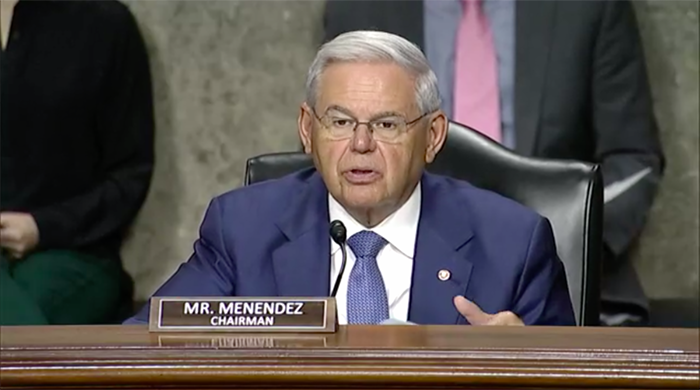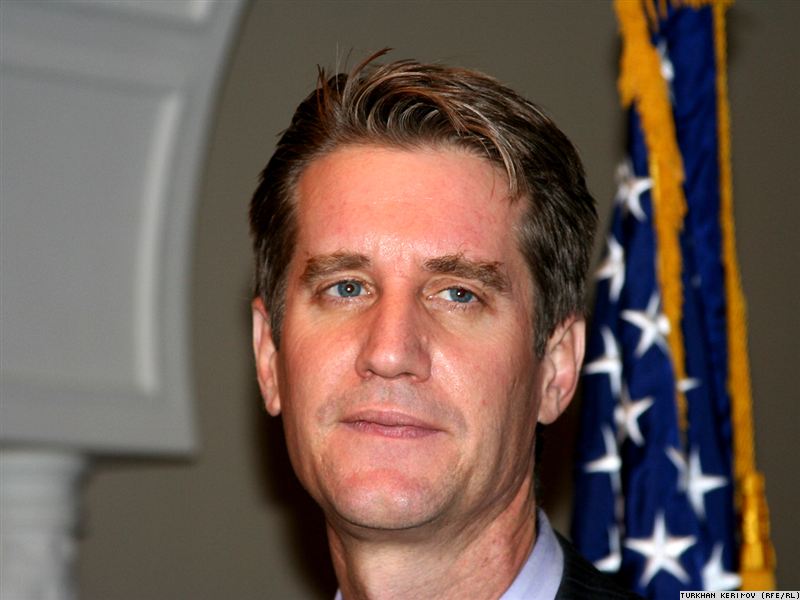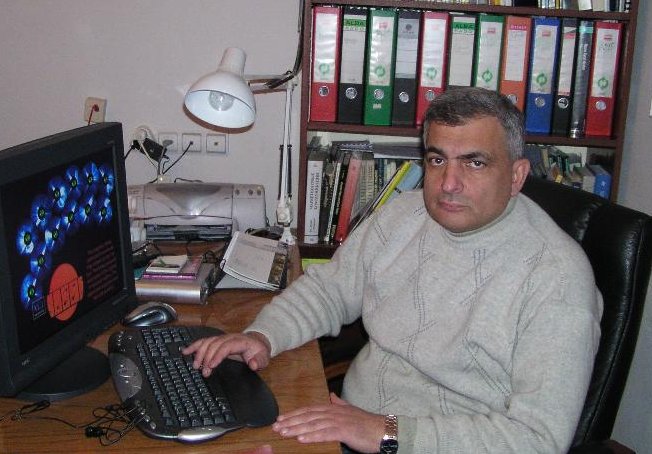WASHINGTON, D.C. – Senator Bob Menendez (D-NJ), Chairman of the Senate Foreign Relations Committee, referred to the Artsakh war and Turkey’s counterproductive role in the South Caucasus region during a full committee hearing Wednesday on U.S. Policy on Turkey with Victoria Nuland, Under Secretary of State for Political Affairs, reported the Armenian Assembly of America.
In his opening remarks, Chairman Menendez cited the “pattern of Turkish aggression that has become the norm.”
He stated: “Last summer, Erdogan provided military support to Azerbaijani strikes against ethnic Armenians in Nagorno-Karabakh. He also facilitated the passage of militants from Syria to fight on the side of Azerbaijan. Yet these actions solicited no penalty from the Trump Administration. No concrete reaction from the international community. No sanction. This is unacceptable.”
Chairman Menendez said he “expects more” from the Biden Administration and looks forward to “understanding how the State Department views Turkey’s role in last year’s war and what measures can be taken in response.”
During an exchange with Under Secretary Nuland, Chairman Menendez asked her if she is familiar with Turkey “facilitating the transfer of fighters from Syria to Azerbaijan during the 2020 war in Nagorno-Karabakh.”
Under Secretary Nuland responded by requesting to “discuss that last point in a separate session” and “in another setting.”
Chairman Menendez pressed on that he would be “looking forward to hearing from the Department” and whether there was an investigation of the “Turkish drones used by Azerbaijan in the war last summer that included U.S. produced parts, which I find totally unacceptable.”
In Under Secretary Nuland’s written testimony, she referred to Nagorno-Karabakh and how “we also press Turkey to avoid entanglements in regional conflicts that threaten long-term stability. The role played by third parties, including Turkey, in last year’s fighting in the Nagorno-Karabakh conflict exacerbated regional tensions. We have pressed Turkey to urge Baku to release all detainees immediately, to support the ceasefire between Armenia and Azerbaijan, and to help the sides work towards a sustainable, long-term political solution to the conflict.”
Also during the hearing, Senator Chris Van Hollen (D-MD) criticized Turkey’s “malign actions” against Armenians.
“This hearing of the Senate Foreign Relations Committee will come to order. Let’s start with very recent developments from the region.
Yesterday, President Erdogan visited illegally-occupied Cyprus and announced a plan to develop the seaside town of Varosha. Over the years, I have met Greek Cypriots who had to evacuate Varosha in 1974, fleeing the invading Turkish army for safety. Many of them ended up immigrating to the United States. Forty seven years following the invasion, their stories remain harrowing, a daily reminder of those terrible days in 1974. For years, many in the international community, including President Biden himself have supported a peace process which would establish a bi-zonal, bi-communal federation on the island. Erdogan’s visit cast these efforts aside as well as longstanding UN resolutions on Varosha.
His goal is to advance a separate state on the island of Cyprus. Simply put, this violation of international law is unacceptable and I expect to hear from the Under Secretary today a plan on how the Biden administration will respond. I led a letter with several members on this Committee to the President last week. Erdogan’s actions are not simply about Cyprus, but mark a crucial test for the UN system and the U.S. response. We need to see a strong statement from the UN Security Council today condemning this move.
Unfortunately, this pattern of Turkish aggression across the region has become the norm. Last summer, Erdogan provided military support to Azerbaijani strikes against ethnic Armenians in Nagorno-Karabakh. He also facilitated the passage of militants from Syria to fight on the side of Azerbaijan. Yet these actions elicited no penalty from the Trump administration, no concrete reaction from the international community, no sanction. This is unacceptable. I expect more from this Administration than I did the last and I look forward to understanding how the Department views Turkey’s role in last year’s war and what measures can be taken in response.
I appreciate the excellent work done by the Biden administration in reestablishing our rock solid bond with NATO. It is the most powerful alliance in the history of the world and an absolutely essential pillar of U.S. national security. So when Turkey, as a NATO member, introduces a Russian S-400 air defense system into its territory it poses a significant threat to NATO. It poses a significant threat to U.S. pilots. It poses a significant threat to our partners.
Under no circumstances will I support the lifting of CAATSA sanctions if the S-400 remains in Turkey. Nor would I support Turkey rejoining the F-35 program. I am proud of the role played by Congress to advance these sanctions and ensure their implementation. The message should be clear – any effort to weaken NATO from within or outside will be met by a robust response by the United States.
In Syria, the United States and Turkey remain at cross-purposes. Through multiple military interventions, some of which were directly green-lighted by the previous Administration, Turkey has created several zones of control in northern Syria that encompass 4,000 square miles — roughly the size of Lebanon – and contain 4 million people, equivalent to the population of Croatia.
While these areas provide safe haven for millions of Syrians displaced from government-controlled areas, they have done so at a horrific cost to the local Kurdish population, who have endured forced displacement and kidnappings, unlawful detention and torture, illegal property seizures, and numerous other human rights violations at the hands of Turkish-backed opposition forces.
Beyond the considerable human rights concerns, these actions directly undermine the United States’ counterterrorism partnership with the Syrian Democratic Forces and our shared fight against the Islamic State. This is also unacceptable.
President Erdogan has publicly asked President Biden for greater cooperation with Turkey in Syria. It is paramount that the Administration provide the Committee with greater clarity concerning how it is addressing Turkey’s role in the numerous human rights violations committed in northern Syria and the conditions it will apply to any enhanced cooperation with Ankara in this regard.
In Libya, despite the successful creation of a unity government after years of conflict, Turkey continues to maintain thousands of Syrian mercenaries, the presence of which—along with Russian-backed foreign fighters — threatens both the country’s upcoming elections as well as its fragile peace.
Turkey has capitalized on the vulnerability of Libya’s previous government to extract a maritime border agreement that is in direct conflict with U.S. interests in the Eastern Mediterranean and violates Greece and Cyprus’ internationally-recognized maritime boundaries and rights.
These are not the actions of a constructive partner, let alone a NATO ally.
Erdogan sees his country as on par with the great powers of the world. It’s not. President Erdogan has tragically shredded its democratic institutions, imprisoned journalists. He has targeted his political opposition for arrest and sought to silence university professors. To say that more lawyers and journalists are arrested and in jail in Turkey than in any other place in the world is saying something considering some of those other places in the world. These are the actions of a weak government, not a world power. And we should treat it as such.
This treatment extends to United States Embassy and consulate staff in the country. To this day, several individuals remain in prison on trumped up charges. It is disgraceful – The Under Secretary I’m sure will agree that U.S. embassy staff should never be treated this way. Anywhere. Especially by a so-called ally. I look forward to hearing an update on their status and our efforts to secure their freedom.
We all hope for a day when Turkey embodies a high standard of democratic values and respect for human rights expected from a NATO member. The region and the world needs a stable and democratic Turkey. Under Erdogan, such a future is but a dim hope. I look forward to the Under Secretary’s views on these and other issues and we appreciate your appearance before the Committee.
With that, let me recognize the distinguished Ranking Member Risch for his opening remarks.”










